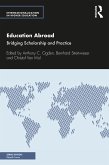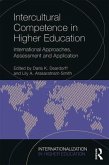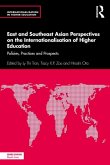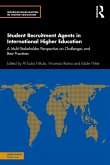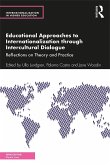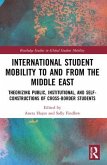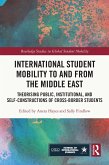Providing the academic community with a robust and highly practical insight into the importance of implementing relationship building into the learning environment and experiences of all students, underpinned by current research, this innovative volume explores intercultural learning and critical pedagogy in the borderless university.
By revealing cutting-edge theoretical perspectives and practice which can facilitate critical connections between diverse students, their learning, curriculum, each other, and their communities, Learner Relationships in Global Higher Education integrates academic and student perspectives on relationship development into academic practice. Drawing upon case studies and examples of good practice from across the globe, this book illustrates how practitioners in diverse contexts are designing student experiences in face-to-face and online contexts on- and off-campus to advance learner relationships. By situating this work in a critical pedagogy perspective, the book advances internationalisation in and for a global and multicultural world.
In the changing contexts of global higher education, this book is a valuable tool for higher education researchers and practitioners at all stages of their careers.
By revealing cutting-edge theoretical perspectives and practice which can facilitate critical connections between diverse students, their learning, curriculum, each other, and their communities, Learner Relationships in Global Higher Education integrates academic and student perspectives on relationship development into academic practice. Drawing upon case studies and examples of good practice from across the globe, this book illustrates how practitioners in diverse contexts are designing student experiences in face-to-face and online contexts on- and off-campus to advance learner relationships. By situating this work in a critical pedagogy perspective, the book advances internationalisation in and for a global and multicultural world.
In the changing contexts of global higher education, this book is a valuable tool for higher education researchers and practitioners at all stages of their careers.
"Relationships between students of diverse backgrounds, sometimes framed as tensions between local and non-local students on university campus, have always been a challenging issue presenting a barrier to effective internationalisation in higher education. This book critically analyses the phenomenon using various cutting-edge theoretical perspectives and proposes critical intercultural pedagogy as a means to promote constructive learning relationships. I strongly recommend this book to researchers and practitioners who would like to understand the challenges of intercultural learning and, more importantly, aspire to make a real change."
-Tracy Zou, PhD, SFHEA, Assistant Professor, The University of Hong Kong
"By drawing on the perspectives of critical pedagogy, scholarship, practice-based research, and the authors' own personal experiences, this book presents a compelling case for critical intercultural pedagogy and provides a practical and inspiring path for effecting real change in the classroom and across programs and courses. The book will be a great resource for anyone wanting to expand the transformational possibilities for learners in this multicultural world."
-Dr Craig Whitsed, School of Education, Curtin University, Australia
"Learner Relationships in Global Higher Education is an essential resource for faculty and international educators at a time when knowledge and learning are shaping the future of humanity and the sustainability of the planet. Killick and Foster offer a holistic and comprehensive framework for equity and inclusion in the borderless university. The book includes practical and research-driven insights shaped by a powerful vision for critical intercultural pedagogy that addresses the challenges we face in a hyperconnected world."
-Chris R. Glass, Associate Professor, Old Dominion University, Norfolk, Virginia
"A book that articulates clearly the relationship between internationalisation and the continuing coloniality of higher education - irrespective of context - is both welcome and timely, given the growing emphasis on decolonising the university. The book is positioned within a range of current, theoretical perspectives, with several of the chapters embedding case studies written by practitioners from myriad contexts. Such case studies illustrate the powerful learning that occurs - disciplinary and personal - when critical pedagogy is at the heart of higher education. This wide-ranging and valuable book will be of significant interest to researchers, practitioners and students in higher education environments across the globe and is a welcome addition to the field of critical pedagogy."
-Sheila Trahar, Professor Emerita, University of Bristol, UK
"Certainly, David Killick's writings always demonstrate distinctive originality, clarity and unusual intellectual depth. This book results from a fertile cooperation with Monika Foster, whose work on internationalisation of the curriculum emphasises learner motivations and experience, skill development and practical resources for teachers of Business and management. By taking learner inclusion as an overarching value that transcends both culture and tradition, this book offers a way of dealing with some of the more difficult aspects of multicultural and international education."
-Martin Haigh, Professor Emeritus, NTF, SFHEA, Oxford Brookes University, England
-Tracy Zou, PhD, SFHEA, Assistant Professor, The University of Hong Kong
"By drawing on the perspectives of critical pedagogy, scholarship, practice-based research, and the authors' own personal experiences, this book presents a compelling case for critical intercultural pedagogy and provides a practical and inspiring path for effecting real change in the classroom and across programs and courses. The book will be a great resource for anyone wanting to expand the transformational possibilities for learners in this multicultural world."
-Dr Craig Whitsed, School of Education, Curtin University, Australia
"Learner Relationships in Global Higher Education is an essential resource for faculty and international educators at a time when knowledge and learning are shaping the future of humanity and the sustainability of the planet. Killick and Foster offer a holistic and comprehensive framework for equity and inclusion in the borderless university. The book includes practical and research-driven insights shaped by a powerful vision for critical intercultural pedagogy that addresses the challenges we face in a hyperconnected world."
-Chris R. Glass, Associate Professor, Old Dominion University, Norfolk, Virginia
"A book that articulates clearly the relationship between internationalisation and the continuing coloniality of higher education - irrespective of context - is both welcome and timely, given the growing emphasis on decolonising the university. The book is positioned within a range of current, theoretical perspectives, with several of the chapters embedding case studies written by practitioners from myriad contexts. Such case studies illustrate the powerful learning that occurs - disciplinary and personal - when critical pedagogy is at the heart of higher education. This wide-ranging and valuable book will be of significant interest to researchers, practitioners and students in higher education environments across the globe and is a welcome addition to the field of critical pedagogy."
-Sheila Trahar, Professor Emerita, University of Bristol, UK
"Certainly, David Killick's writings always demonstrate distinctive originality, clarity and unusual intellectual depth. This book results from a fertile cooperation with Monika Foster, whose work on internationalisation of the curriculum emphasises learner motivations and experience, skill development and practical resources for teachers of Business and management. By taking learner inclusion as an overarching value that transcends both culture and tradition, this book offers a way of dealing with some of the more difficult aspects of multicultural and international education."
-Martin Haigh, Professor Emeritus, NTF, SFHEA, Oxford Brookes University, England


